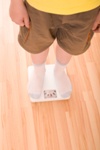Constipation Top Reason for Child ER Visits
[The study] looked at almost 10,000 visits to the emergency room at the Children's Hospital of Pittsburgh by children 1 to 18 years old with abdominal pain. Constipation was the most common specific diagnosis, the cause of the pain in more than a quarter of the childrenwho had any diagnosis made. "Parents are shocked that that's their child's diagnosis," said Dr. Kerry S. Caperell, an assistant professor of pediatrics at the University of Louisville School of Medicine and lead author of the study.
The highest rate of constipation, he said, was found in boys around 10. "My experience is the kids don't like to go to the bathroom at school, so there's a sort of voluntary retention that exacerbates itself."
Constipation is often attributed to deficiencies in our modern diet — not enough fiber, not enough fruits and vegetables — or to the same combination of overprocessed foods and sedentary lifestyle that puts children (and adults) at risk for obesity. So there is often something judgmental in the air when the subject is raised. And mind you, it isn't always raised. It is not, shall we say, a sexy topic.
Children often run into problems with constipation around the age of potty training, when toddlers find themselves in a test of wills with their parents. Jessica Hankinson, a pediatric psychologist at Johns Hopkins Children's Center, said: "We definitely see around potty training what can be considered withholding behavior. They start doing the potty dance, crossing their legs, bending down." Anything, in other words, to keep from cooperating with the parental agenda.
Sometimes those patterns persist. Some children may be physiologically predisposed. Pediatric gastroenterologists and specialty clinics see children with refractory constipation who haven't gotten better with the treatments suggested by their regular doctors.
"Maybe the problem has been underrecognized and undertreated," said Dr. Maria Oliva-Hemker, the chief of pediatric gastroenterology and nutrition at Johns Hopkins University School of Medicine and founder of a constipation clinic there.
And the longer children struggle with the problem, the more severe it can get, for reasons both behavioral and physiological.
"We call it defecation anxiety," Dr. Hankinson said. "You have hard, difficult stools to pass, you have a painful bowel movement, you start withholding." That, in turn, affects the functioning of the colon.
In extreme cases, children can develop what is called encopresis, when liquid stool leaks out around the hard, impacted stuff clogging up the colon. Parents may be worried about diarrhea, or angry about "accidents," when the real problem is constipation.
Image: Emergency room, via Shutterstock
-
Exercise Bike Program – How to Lose Weight
-
Diet Pills – The Answer or Not?
-
Christmas holiday foods and weight loss goals, finding the right balance
The Christmas holidays can lead to weight gain and weight loss
-
Overweight and Hypertension
-
Eat for Beauty
-
Weight Loss and Syndrome X
- DON'T MISS
- The Planned Binge as a Weight Control Measure
- Could Unresolved Emotional Issues be the Reason Your Dieting Attempts Always Fail?
- How I lost 11 Kilograms in 26 days
- Diet and Weight Loss Plans – Where do I Start?
- Should You Go Low Carb?
- How Can We Beat Obesity In Society?
- The Epidemic of Childhood Obesity
- Water: The Hidden Diet Ingredient
- Change Your Life With a Commitment to Weight Loss
- Total Diet




